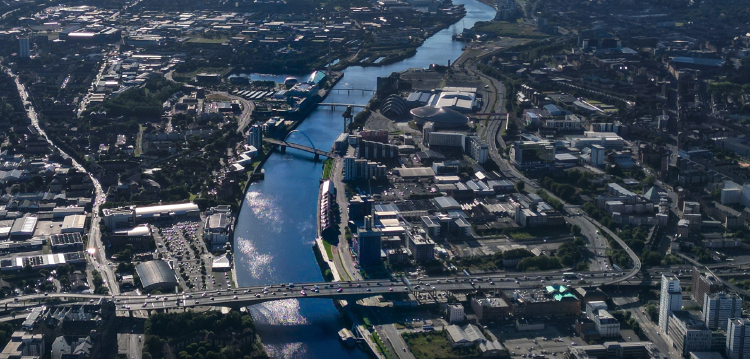Quantifying Glasgow's Emissions Reductions
Analysing trends in territorial CO2 emissions within Glasgow City.
- 2 min read

Originally published by Jack Williamson on the Fraser of Allander Institute’s website, here.
Download the report from the Fraser of Allander Institute
This report focuses on analysing trends in territorial carbon dioxide (CO2) emissions within Glasgow City. In 2019, Glasgow City Council declared a climate and ecological emergency and set a target to achieve net zero carbon emissions by 2030.
Progress towards this goal is tracked using local authority territorial CO2 emissions data.
Emissions reductions in Glasgow City provide a valuable case study for examining how territorial emissions are disaggregated to the local authority level and how this process may influence the evaluation of climate policies.
The spatial disaggregation of the UK Greenhouse Gas Inventory estimates to the local authority level is complex.
Methodological choices, such as the end-user allocation of electricity emissions and the use of devolved administration-level vehicle fleet data for all local authorities, can obscure the primary drivers of emissions reductions and the extent to which local policymakers can influence these factors.
Key findings:
- The largest single factor driving emissions reductions in Glasgow City, and more broadly in the Glasgow City Region, is the decarbonisation of the UK electricity grid, which lies outside the direct control of local policymakers. UK-wide reductions in the emissions intensity of electricity consumption are reflected in local emissions estimates through the end-user allocation of electricity emissions and account for 45% of the overall CO2 reduction in Glasgow between 2005 and 2022.
- Emissions from domestic and non-domestic gas consumption have been a leading source of CO2 emissions in Glasgow since 2016, despite an overall 31% decrease between 2005 and 2022. Territorial emissions estimates are highly sensitive to changes in gas consumption, making household decarbonisation policies a key area for future emissions reductions.
- Transport policy has been a focal point of decarbonisation efforts in Glasgow and Glasgow City Region. Our research finds that key policies, such as the electrification of Glasgow’s bus fleet, are likely to be poorly reflected in reported emissions estimates due to the methodological choices around the detail of data within the allocation of UK emissions to local authorities. This is concerning, as local policy actions that could lower CO2 concentrations and improve air quality may be undermined if emissions reductions cannot be adequately demonstrated within the existing territorial estimates.